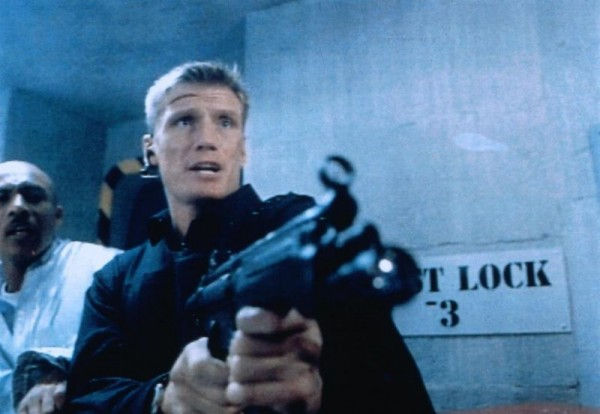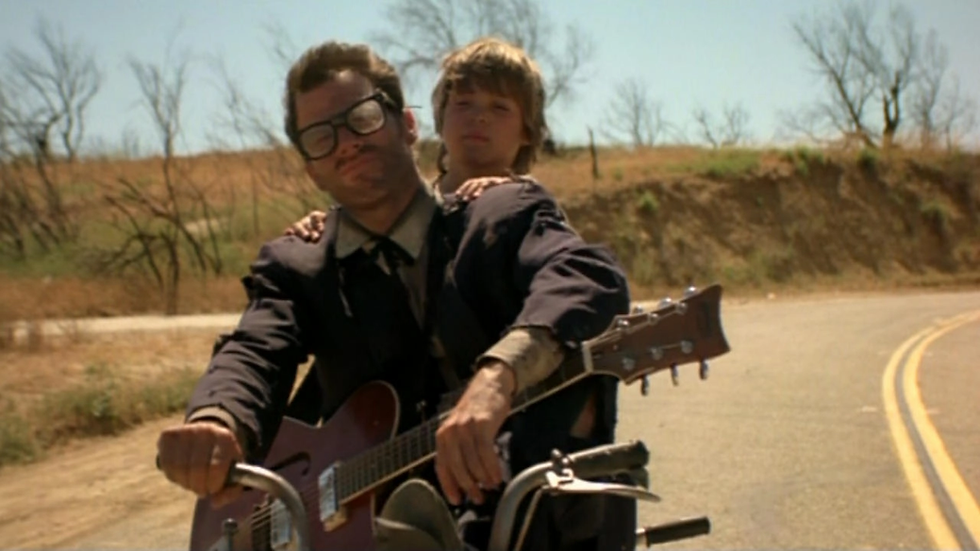My Friend, Dolph Lundgren
- Marten Carlson
- Jan 19, 2021
- 8 min read
Updated: Jan 12, 2022

Growing up, my family took our Swedish heritage very seriously. We celebrated holidays such as Lucia Day and Midsommar (just, you know, without the pagan rituals). We spoke broken Swedish around the house. My brother and I actually attended Swedish camp, where we bettered our understanding of the Swedish language and culture.
That’s right. Swedish camp.
Looking back, I think this was primarily a way for my mom and dad to pay tribute to my mom’s father, Nils. In 1925, at the tender age of eight, Nils emigrated from the wilds of Sweden to the exciting flatland of Illinois. His was the classic bootstraps story where, without even a high-school education, he ended up owning his own factory and built himself the classic American suburban clan.
Nils passed in 1987 but, for my mom and dad, he remains as the never-forgotten Founder of the Feast. His emotional and financial generosity allowed my parents to continue their schooling after college (in Scotland, no less) and eventually secure careers in higher education. In a weird way, every Swedish meatball and Christmas carol was a tribute to the man who made our current middle class lifestyle possible.
Me? I hardly remember the guy. Grandpa Nils was gone by the time I was three and, besides some blurred recollections that are honestly a mix of stories told and photos taken, I cannot remember us actually meeting. Nils is nothing more than a familial folk tale, masquerading as personal history.
As a result, the Swedish pomp and circumstance didn’t really belong to me as a youngster. It belonged to my mom, dad, and brother (who got to know Nils for a solid ten years). I didn’t have my own relationship with my Swedishness. Nothing that I could call my own.
To be frank, it wasn’t something I really wanted. Swedish culture was, how do I say it nicely? Uncool. Anytime I mentioned my Swedish background, friends would berate me with the obligatory Swedish Chef “Urgy burgy burgy”. Good stuff. As a cinephile, I was years off from my appreciation of Ingmar Bergman’s trademark genius Nordic melancholy. In short, I was just a dorky kid who would wear Swedish soccer jerseys to school. It’s a miracle I didn’t get my ass kicked.
It all changed when I discovered HIM.

Dolph. Lundgren.
If I'm being real, I can’t rightly remember when I saw my first Dolph Lundgren film. It must have been Masters of the Universe (1987). As a kid, I was utterly obsessed with the toy line and cartoon. He-Man, Man-at-Arms, and Fistor (Jesus, that name). I had them all.
Reading about the film now, it’s clear the project was an utter disaster, both critically and financially. Masters of the Universe was a huge gamble for Cannon Group honchos Menahem Golan and Yoram Globus. By hitting it big with a known IP cash grab, they hoped to move on to even bigger fare like Spider-man (which was supposed to be a body horror movie movie by Tobe Hooper? Anyway...). However, by 1987, interest in the Eternian adventures of Prince Adam and his plucky band was waning. And let’s not forget that the producer ran out of money before the film was in the can. That last fight scene that basically takes place in the dark? Yeah, that wasn’t what we'd call an "artistic choice".
None of that mattered to me. Masters of the Universe fleshed out my imaginary heroes and delivered me a real life hero in Dolph Lundgren. He-Man is Swedish? And he was fucking strong? It was almost too good to be true. Hindsight being 20/20, the dude was obviously juicing, and the film must have employed at least 100 gallons of baby oil for that heroic bronze sheen. Not to mention, Dolph’s heavy Swedish accent only allowed for a handful of mumbled lines.
But, all Little Marten saw was a Swede who was actually cool.
When I became a teenager, my cynicism grew with regard to politics, parental control, and things I innocently enjoyed as a kid. I even started to see Dolph in a new light. He made a run at the pantheon of cinematic “hardbodies”, hoping to join the ranks of Schwarzenegger, Stallone, Van Damme, and came close with Universal Soldier (1992), but ultimately fell somewhat short. Not for lack of trying, obviously.
By the mid-to-late 1990s, his work was mostly relegated to straight-to-video purgatory, which resulted in low rent Dolph vehicles such as Hidden Assassin (1995), Bridge of Dragons (1999), and Jill Rips (2000). Maybe it was time to move on. I was no longer a child, and had to put away childish things.
But, I just didn’t want to lose Dolph Lundgren.
This is when I learned about a new way to appreciate something ridiculous. I learned the term “guilty pleasure.” Now, I think the idea is complete bullshit. You either like something or you don’t. Or, as Marie Kondo says, it either sparks joy or it doesn’t. However, as a thirteen-year-old Indiana Swede, looking at Dolph as a guilty pleasure allowed me to circumnavigate my adolescent cynicism and hold onto something that did bring me genuine cinematic elation.
Hot damn, those were some wonderful years. Everytime I found myself at the video store, I looked in their sale section for any Dolph flicks the local chain was trying to pawn off. I think I was the only Dolph fan in Franklin, Indiana, so my searches usually bore fruit. I picked up gems such as The Peacekeeper (1997), Sweepers (1998), and Storm Catcher (1999).

These are the Holy Trinity of Lundgren. Sweepers tells the story of Christian Erickson, a NATO agent in charge of ridding Angola of wartime landmines. For some reason, Dolph invites his son, Johnny, to come visit him in the middle of a war zone. The kid wants to see his Dad work, so he stows away in the Jeep and pops out during a little gun battle.
Of course, little Johnny gets blown to shit, leaving Dolph to scream in slow motion. Later, when he finds out who is responsible for his son’s death, he stands over his son’s grave, shotgun in hand. He juts out his lantern jaw and says, "you be a good boy, Johnny. Daddy’s going to work.”
I remember watching Sweepers with my Dad, and this line cracked him up. I knew it was ridiculous, and I laughed along. However, my Dad’s cackle came from a disdainful place for Dolph, which only strengthened my resolve. It made Dolph even more my thing.
In Storm Catcher, Dolph seems to be struggling with his own Swedishness. Every scene, every frame, is intent on erasing his heritage and replacing it with generic, gung-ho American bullshit. Dolph coaches his daughter’s pee wee football team and even spends some time by the campfire roasting marshmallows. In these Rockwellian tableaus, Dolph sticks out like a sore thumb.
It’s even better when he tries to shoot the shit with other Americans. His ribbing of fellow pilots comes off stilted (at best). When he needs something from a dimwitted New Yorker mechanic, you can actually see the wheels turning as he pretends to be from Brooklyn. It’s like a Mike Hammer scene played at quarter-speed. Not pretty.
The mechanic almost catches Dolph in the act when he asks him what school he went to. What follows is an uncomfortably long pause. Then, Dolph responds, “Hey! Who the fuck went to school?” and gives the mechanic some playful hits on the arm. It’s fucking hilarious.
This may all sound pretty mean, but let me assure you, these are the moments that make Dolph’s work come alive. This isn’t the early 2000s fare of Jean-Claude Van Damme or Mark Descascos drivel. Dolph’s films are prime earnest entertainments. There is not a drop of cynicism in any of them. Nothing but sincerity as far as the eye can see.
Watching these films, it’s like Dolph and the filmmaking teams are about two, three, sometimes ten years behind Hollywood action conventions. The villains are simple and single-minded, more akin to the Arnold foils of the late '80s, and far less thoughtful than '90s genre Machiavellis (think: Jeremy Irons in Die Hard With a Vengeance [1995]).

Speaking of Die Hard, this storytelling jet lag is no more evident than in The Peacekeeper (1997). A McClane rip off arriving a whopping nine years after its release, terrorists take over a missile silo and threaten to blow up Washington. It’s as simple as that. Dolph even has a black partner. Montel. Feaking. Williams. Their report is right out of the Shane Black handbook, minus about 90% wit. If anything, Montel actually makes Dolph come across as the better actor. It’s truly something to behold.
Still, in all three of these films, Dolph is perfectly awkward. Big, Swedish, lumbering, and just giving it all he’s got. As a big, Swedish, lumbering teen, it’s no surprise that I took to his demeanor. Considering how low quality some of these works were, it was almost pure will that kept my love of Dolph alive.
When I finally learned how to talk to girls, my relationship with Dolph had to take a back seat. Thankfully, by the late aughts, he was pumping out five films a year. It was pretty much impossible to keep up with his output. Along the way, life just happened. Seasons changed. I fell in love with other actors and filmmakers. Dolph was merely an old flame.
Then, one day, the Lundgren came back into my life. After grad school, I was working the worst job ever. There’s that mid-twenties moment when you realize it just ain’t going to happen, and you may just have to settle. At least, that was my thinking until the trailer for The Expendables (2010) arrived. Dolph was back on the big screen, and he brought his friends (or Sly brought him. Semantics really). Seeing the film in the theater, it was like a crack in this lame adult suit I had built. Exploding pirates. A 10-minute brawl with Jet Li. It was all perfectly ridiculous.
I’m pretty sure that’s when I decided to quit that shitty job. I can’t be positive, but it makes for a good story, right?
As I began to actually work toward building a creative life I could actually enjoy, Dolph’s career improved. He started appearing in shows like Workaholics and getting mentioned in It's Always Sunny in Philadelphia. Dolph even showed up in huge Hollywood blockbusters such as Aquaman (2018). The old dude was truly having his day.
In 2017, my dream came true. I actually got a chance to meet Dolph Lundgren. He was going to appear at Fantastic Fest, promoting his new film, Don’t Kill It. I was going to be there, covering the fest for a publication. It was fate.
During the premiere for Don’t Kill It (2017), I sat near the front of the theater. After answering a few questions following the film, Dolph made to exit.
This was my chance. I jogged to the end of the row and was able to meet him as he passed. I stuck out my hand and said, “Hey, I’m Swedish-American, and I grew up watching your films. I just wanted to say thanks.”
He stopped, looked at me, 6’7” and with a huge beard, and simply replied, “You look Swedish. You should be carrying an axe.”
Then, he walked away.
It took me a few minutes to shake out of my fugue state, but I finally came to. As my head began to clear, I just thought one thing:
Man, it is cool to be Swedish.
Marten Carlson is a filmmaker, screenwriter, longtime critic and co-founder of Secret Handshake.



Comments